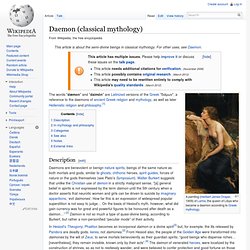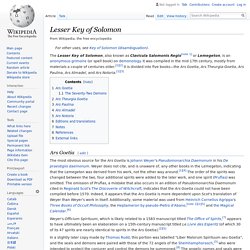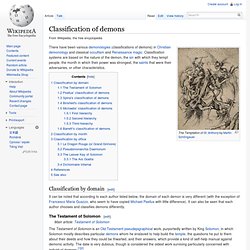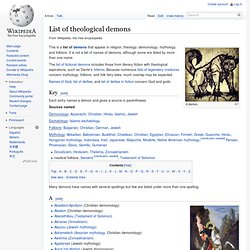

Daemon (classical mythology) The words "dæmon" and "daimôn" are Latinized versions of the Greek "δαίμων", a reference to the daemons of ancient Greek religion and mythology, as well as later Hellenistic religion and philosophy.[1] Characterizations of the daemon as a dangerous, if not evil, lesser spirit were developed by Plato and his pupil Xenocrates,[2][dubious ] and later absorbed in Christian patristic writings along with Neo-Platonic elements.

In the Old Testament, evil spirits appear in the book of Judges and in Kings. Satanists have used the word demon to define a knowledge that has been banned by the Church. Carnelian gem imprint representing Socrates, Rome, 1st century BC - 1st century AD. Burkert suggests that, for Plato, theology rests on two Forms: the Good and the Simple; which “Xenocrates unequivocally called the unity god” in sharp contrast to the poet's gods of epic and tragedy.[2] Although much like the gods, these figures were not always depicted without considerable moral ambiguity:
Ἀγαθὸδαίμων. The Lesser Key of Solomon. The Lesser Key of Solomon, also known as Clavicula Salomonis Regis[note 1] or Lemegeton, is an anonymous grimoire (or spell book) on demonology.

It was compiled in the mid-17th century, mostly from materials a couple of centuries older.[1][2] It is divided into five books—the Ars Goetia, Ars Theurgia-Goetia, Ars Paulina, Ars Almadel, and Ars Notoria.[1][3] Ars Goetia[edit] The most obvious source for the Ars Goetia is Johann Weyer's Pseudomonarchia Daemonum in his De praestigiis daemonum. Weyer does not cite, and is unaware of, any other books in the Lemegeton, indicating that the Lemegeton was derived from his work, not the other way around.[1][4] The order of the spirits was changed between the two, four additional spirits were added to the later work, and one spirit (Pruflas) was omitted.
This portion of the work was later translated by S. The Seventy-Two Demons[edit] Ars Theurgia Goetia[edit] Ars Paulina[edit] Ars Almadel[edit] Ars Notoria[edit] Editions and translations[edit] Classification of demons. There have been various demonologies (classifications of demons) in Christian demonology and classical occultism and Renaissance magic.

Classification systems are based on the nature of the demon, the sin with which they tempt people, the month in which their power was strongest, the saints that were their adversaries, or other characteristics. Classification by domain[edit] It can be noted that according to each author listed below, the domain of each demon is very different (with the exception of Francesco Maria Guazzo, who seem to have copied Michael Psellus with little difference). It can also be seen that each author chooses and classifies demons differently. The Testament of Solomon[edit] Psellus' classification of demons[edit] Michael Psellus prepared a classification of demons in the 11th century, which was an inspiration for the classification Francesco Maria Guazzo prepared later.
Spina's classification of demons[edit] Binsfeld's classification of demons[edit] First hierarchy[edit] List of theological demons. A demon This is a list of demons that appear in religion, theology, demonology, mythology, and folklore.

It is not a list of names of demons, although some are listed by more than one name. Names of God, list of deities, and list of deities in fiction concern God and gods. Key[edit] Each entry names a demon and gives a source in parentheses. Sources named Demonology: Ayyavazhi, Christian, Hindu, Islamic, Jewish Eschatology: Islamic eschatology Folklore: Bulgarian, Christian, German, Jewish Mythology: Akkadian, Babylonian, Buddhist, Chaldean, Christian, Egyptian, Etruscan, Finnish, Greek, Guanche, Hindu, Hungarian mythology, Indonesia, Irish, Japanese, Mapuche, Moabite, Native American mythology,[clarification needed] Persian, Phoenician, Slavic, Semitic, Sumerian Many demons have names with several spellings but few are listed under more than one spelling.
A[edit] B[edit]